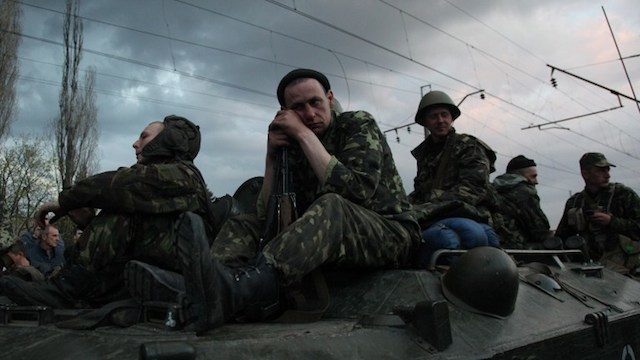SUMMARY
This is AI generated summarization, which may have errors. For context, always refer to the full article.


KIEV, Ukraine (Updated) – The humiliation of the Ukrainian army in its much-vaunted “anti-terrorist” push into separatist eastern territory makes an embarrassing string of failures even worse.
Allowing pro-Russian rebels to seize six of its armored personnel carriers and disarm its servicemen on Wednesday, April 17, was evidence of a poorly planned and executed operation, analysts said.
They pointed out that the region, the Donbass, is hostile to Kiev’s new, pro-EU leaders, and home to magnates and police reluctant to face down the separatists.
“It was a mistake to launch an ‘anti-terrorist operation’ in the Donbass where the overwhelming majority is against the government. Targeted operations against armed groups is one thing, but when there are tanks in the street, people block them,” said a Ukrainian political analyst, Volodymyr Fesenko.
A military expert at the Razumkov think-tank in Kiev, Oleksiy Melnik, criticized the government for hesitating to use force and in the end sending in a smaller force than the one implied when it announced its “major operation” on Sunday.
“The arguments that ‘We mustn’t provoke Russia’ are absurd in the current situation, because Russia needs no pretext to carry out its plan. The reason behind what happened is government inaction,” he said.
Demoralized army
Since Saturday, pro-Russian insurgents have controlled every political lever Slavyansk: the town hall, the police station and even the secret service headquarters, taking any weapons still left for the taking.
Ukraine vowed to take the town back, and on Sunday deployed a significant loyalist force to do so. Two helicopters, dozens of light armoured vehicles and roughly 300 troops moved in as close as 40 kilometres (25 miles) from Slavyansk’s city limits.
But the Ukraine troops moved no further. Their armoured vehicles were blocked by pro-Russian militants. Six vehicles were seized.
“The armored vehicles were stopped by unarmed civilians, who they cannot shoot. That showed how badly thought-through the operation was, Melnik said.
“These sorts of defeats are demoralising the army, whose fighting spirit has already been undermined by the events in Crimea,” where Ukrainian soldiers ended up abandoning their units without offering any resistance to the Russian forces, Melnik said.
Now, in scenes reminiscent of the seizing of Crimea in March, soldiers without insignia roam the streets protecting a political breakaway that is sure to draw fierce criticism not only from the Ukrainian government, but from the international community as well.
To Kiev, these troops are Russian special forces, here to do the bidding of President Vladimir Putin as he seeks to grab as much of Ukraine as he can. To the residents, they are like-minded Ukrainians, a guarantee that Russian-speaking compatriots are protected from a vengeful and illegal Ukrainian government.
A few dozen kilometres (miles) up the road, another column of 14 Ukrainian tanks is stopped in its tracks, blocked by fervent but unarmed pro-Russians including women and children.
Here too the scene borders on the festive, as onlookers snap photos of laconic Ukrainian soldiers sitting and waiting on their tanks and armoured vehicles.
“I don’t know where we were going, we were moving that’s all,” said one soldier as a fellow officer laughed carefully beside him.
“There’s no problem, all is good. These people are our people. We’re having a rest then we’ll go home,” he said.
And after hours of haranguing by the crowd, the soldiers eventually vow to reverse course, abandoning any plans to retake Slavyansk and agreeing to give up the firing mechanisms in their guns in return for a promise they can leave with their vehicles.
“Weapons will never again be used against the people,” an insurgent told to the ebullient crowd, as some Ukrainian soldiers wipe away tears nearby.
Under-funded
Under-funded and possessing outdated weapons, the 130,000-strong Ukrainian army is easily overshadowed by the Russian one, which is six times bigger — and which currently has 40,000 men massed on Ukraine’s eastern border, according to NATO.
Kiev asserts that the armed, pro-Russian rebels are being managed by Russian military intelligence officers on the ground. Several hundred trained military personnel carrying the sort of weapons used by Russia’s elite forces and wearing uniforms stripped of any insignia can be seen in the region, but Moscow denies they are its soldiers.
Another military expert, Mykola Sungurovsky, said Ukraine has sent its best men and equipment to the border to protect it.
“But they are only capable of rebuffing a first assault. After that, they would need to turn to guerrilla actions because the balance of forces is not in our favour.”
Several analysts observed that Ukraine’s military is the main force loyal to Kiev’s government in the east; the police, they said, did nothing to stop the pro-Russian assaults on public buildings and police stations in several towns in the region.
In Donetsk, the main city in the east, “the situation is very complicated,” the interim first deputy prime minister Vitaliy Yarema acknowledged on Wednesday. “Some police officers are at the command of the separatists.”
But Mykhaylo Kornyenko, a former deputy interior minister, said the police should not be blamed.
“Police stations were attacked by men with combat experience whereas they lack such experience. If they had used their weapons, the consequences could have been catastrophic.”
Olexandra Rudneva, an analyst at the Strategic Studies Institute, said, however, that many police are also bitter towards the new authorities for not punishing those responsible for the deaths of more than 100 people during the mass protests in Kiev early this year, and for being used as scapegoats for that bloodshed.
“In this situation, whoever is in power in Kiev would have a tough time exerting influence over the police, especially in Donetsk,” she said. – with reports from Nicolas Miletitch, Agence France-Presse
Add a comment
How does this make you feel?
There are no comments yet. Add your comment to start the conversation.